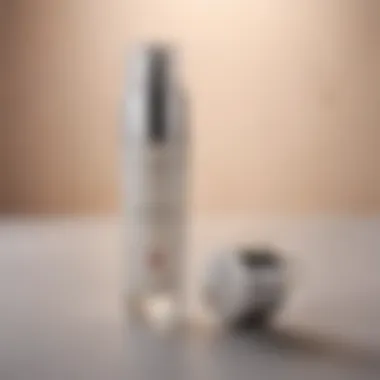Unlocking the Comprehensive Benefits of Retinol Lotion


Intro
Retinol lotion has gained considerable attention in recent years, primarily due to its effectiveness in treating various skin concerns. This article examines the many benefits of retinol, backed by scientific evidence and practical understanding. For the informed consumer, understanding retinol’s role within a skincare regimen can enhance decision-making around its use and ultimately improve skin health. From its ability to remodel skin tissue to address the signs of aging, retinol serves as a sophisticated option in the broader landscape of skincare products.
Trend Report
Latest Beauty Trends
Retinol is not simply a longstanding staple; it is also at the forefront of emerging beauty trends. Many consumers now favor formulations that integrate retinol with additional nourishing ingredients. This shift signifies a move towards the combination of efficacy and comfort. Moreover, the popularity of serums over traditional lotions is increasing, catering to those preferring lightweight textures while benefiting from retinol's potency.
Seasonal Trends
The interest in retinol can fluctuate seasonally. During warmer months, a heightened focus on anti-aging products prompts many to reconsider their skincare routines. The arrival of cooler weather often sees a renewed interest in moisturizing formulations. Thus, marketers are emphasizing products that combine retinol with hydrating elements suitable for transitional seasons.
What is Retinol?
Retinol, a derivative of vitamin A, plays a crucial role in skin cell turnover. It promotes the shedding of dead skin cells and the generation of new ones. This process helps address a variety of skin concerns such as fine lines, uneven tone, and acne. Its fundamental contribution to skin health is notable, given its ability to engage with skin receptors and instigate cascades of beneficial cellular activity.
Retinol’s effectiveness extends to providing a clearer, more youthful appearance by enhancing collagen production and minimizing the appearance of pores.
Understanding Skin Types
To optimize the use of retinol, it is essential to match the product to individual skin types. Consideration of your skin type can influence not just the choice of retinol but also the method of application. Different formulations cater to different needs, from gel-based options for oily skin to creamier textures for dry or sensitive skin.
Application Tips
Ensuring appropriate usage of retinol can maximize its benefits. Start slow by applying it once or twice a week, gradually increasing application frequencies as your skin adjusts. Applying sunscreen is crucial when using retinol, as it can heighten skin sensitivity to sunlight. Incorporating it into an evening skincare routine, after cleansing and before moisturizing, is typically recommended for best results.
Taking all these factors into account paves the way for informed use of retinol lotion. It's not merely about beautification; it's about promoting and safeguarding skin health through scientifically-backed practices.
Understanding Retinol
Understanding retinol is crucial for anyone interested in optimizing their skincare routine. This compound has become synonymous with youthful skin, presenting itself in various lotions and serums. Yet, several fundamental aspects need exploration to fully appreciate its advantages and usages.
Chemical Composition
Retinol, or vitamin A1, is a fat-soluble vitamin fundamentally integral to skin health. Its molecular make-up consists of a cyclic hydrocarbon structure, which underpins its ability to interact with cellular components. Unlike other vitamins, retinol’s effectiveness lies in its conversion to active forms, such as retinaldehyde and retinoic acid. Once absorbed through the skin, it aids in the differentiation of skin cells, promoting a healthier epidermal layer. This interaction drives its efficacy in stimulating collagen synthesis, thereby enhancing skin appearance.
Historical Context
The exploration of retinol traces back decades when dermatologists acknowledged its transformative effects on skin health. Initially utilized in the treatment of severe cases of acne, its benefits quickly became apparent in anti-aging applications. Over the years, the formulation and delivery systems for retinol have evolved significantly. The widespread commercialization of retinol-based skincare products began in the late 20th century, allowing the rich benefits to reach a broader public. This history of innovation reflects retinol's established status in dermatology, likely leading to its often-cited acclaim in skincare.
Retinol vs.
Other Retinoids
Retinol exists within a broader family of compounds known as retinoids. These include various forms, such as tretinoin, adapalene, and isotretinoin, each offering distinct benefits but varying in potency and effects on the skin.
- Retinaldehyde: Less potent than retinol, it offers a gentler approach, suitable for sensitive skin types.
- Tretinoin: Often called prescriptive strength, steals the spotlight for its rapid action but comes with higher skin irritation risks.
- Adapalene: Known for its stabilization, it often targets acne specfically but may have less effectiveness in anti-aging compared to retinol.
The primary distinction among these retinoids relates back to their conversion process in skin, thus influencing consumer choice. When selecting a product, understanding how each one works is pivotal in ensuring optimal use for individual skincare needs.
Skin Benefits of Retinol Lotion
The integration of retinol lotion into a skincare regime brings forth numerous advantages for maintaining skin health. Retinol, a derivative of vitamin A, is revered for its ability to enhance skin's appearance and texture. Focusing on its benefits assists consumers in grasping the significance of this active ingredient and how it addresses several skincare concerns effectively. Understanding these skin benefits becomes essential for those seeking to make informed decisions about their beauty routines.
Promotion of Cell Turnover
Retinol is integral in accelerating cell turnover. This process helps the skin shed old cells and promotes the growth of fresher, healthier cells. The quicker regeneration of skin cells contributes to a more radiant appearance. As dead skin accumulates, it can lead to dullness, clogged pores, and uneven texture. By using retinol lotion, individuals can achieve a more vibrant complexion. Improved cell turnover also assists in mitigating signs of aging, as younger skin cells are typically more resilient and youthful.
Reduction of Fine Lines and Wrinkles


One of the most lauded advantages of retinol is its capacity to diminish fine lines and wrinkles. As skin ages, collagen production naturally decreases, leading to sagging and wrinkles. Retinol helps combat these signs of aging by stimulating collagen and elastin production. Regular use can significantly smooth out surface texture. Through this stimulation, skin becomes more resilient, thus appearing firmer and more youthful. Retinol's visible impact on fine lines often encourages its inclusion in preventive skincare routines by all ages.
Improvement of Skin Texture
Retinol lotion is recognized for its effectiveness in enhancing skin texture. Its properties work at a molecular level to smoothen rough patches and enhance overall clarity. People often encounter issues with uneven skin texture due to factors such as sun damage or environmental stressors. By regularly applying retinol in a proper skincare routine, individuals may experience noteworthy improvements in smoothness. The result is better foundation application and overall cohesion in skin appearance.
Fading Hyperpigmentation
Hyperpigmentation remains a common concern for many users. This condition often arises from sun exposure, hormonal changes, or past acne lesions. Retinol plays a crucial role in stimulating cell turnover, facilitating the shedding of discolored cells, thereby enabling a more uniform skin tone over time. Many users report visible fading of dark spots and a reduction in pigmentation contrast. When coupled with sun protection, retinol may significantly minimize pigmentation irregularities, enhancing overall skin brightness.
Addressing Acne Issues
Targets of acne fighting sorely need solutions that transcend conventional methods. Retinol lotion emerges as a compelling option. Its properties promote unclogging of pores and reduce sebum production, which is pivotal for acne prevention. By influencing skin cell behavior, retinol minimizes inflammation and emphasizes healing processes for existing blemishes. Frequent users may find that their breakout frequency decreases significantly. By incorporating retinol into their routines, individuals tackling persistent acne could find not only clear skin but also fewer reoccurrences of problematic flare-ups.
Skin benefits of retinol lotion go beyond aesthetics; they deliver long-term enhancements that resonate throughout one's overall skin health.
Through each of these facets, it becomes evident why retinol lotion warrants consideration in skincare strategies. With benefits that touch various skin concerns, incorporating retinol into typical regimes speaks volumes about ensuring optimal skin health.
Mechanism of Action
Understanding the mechanism of action behind retinol lotion is essential. It empowers consumers with a comprehensible look into how this retinoid operates on a cellular level. By demystifying the details, we bring transparency into retinol’s legitimacy and efficacy for a variety of skin concerns. Knowledge of this aspect not only guides the correct usage of the product but also enhances the overall foundation of skincare. Thus, the reader can better appreciate why retinol is celebrated in many skincare routines.
How Retinol Works at the Cellular Level
Retinol functions primarily as a vitamin A derivatives that penetrates into the skin upon application. Once absorbed, it converts into retinoic acid, which is the active form influencing skin behavior. This conversion is critical since retinoic acid binds to nuclear receptors in skin cells, initiating a series of biological responses.
These responses stimulate keratinocytes, encouraging their sheding to allow for fresher, more youthful skin to surface. Through this process, cell turnover is accelerated, leading to improved overall skin health. The rapid rate of renewal helps in addressing issues such as uneven texture and discoloration. Importantly, the continual aging effect of UV damage is remedied through deeper skin penetration in ways that other treatments may not achieve.
Influence on Collagen Production
Collagen is a fundamental protein that gives skin structure and elasticity. Its production tends to decrease as one ages, resulting in sagging and wrinkles. Retinol’s role in this context is significant. Retinol promotes the synthesis of collagen by influencing fibroblasts in the dermis layer of the skin. By doing this, it comforts the skin structure and fosters firmness. Studies reveal that sustained usage of retinol can quantitively increase collagen density over time.
Factors influenced by retinol in collagen formation:
- Cellular signaling affected by retinoic acid
- Expression of genes that promote collagen synthesis
- Reducing enzymes that result in collagen breakdown
Although the results are more noticeable after a consistent application period, it offers a promising approach to rejuvenate aging skin.
Effects on Skin Elastin
Elastin works in tandem with collagen to maintain flexibility and resilience in skin. Retinol, although primarily known for its role in collagen production, also contributes to elastin fibers' integrity. Similar to its influence on collagen, retinol aids in the biosynthesis of elastin, essentially enhancing the skin's ability to return to its original shape following stretching or movement.
Ultimately, the retention of healthy elastin fibers can lead to a reduction in fine lines, better recovery from facial movements, and an overall youthful appearance.Ignoring retinol because it does solely address collagen gaps is limiting; its broad-reaching impacts also encompass elastin maintenance.
Applying Retinol Lotion Effectively
Applying retinol lotion effectively is crucial for maximizing its benefits while minimizing potential irritation. The significant impacts that retinol can have on the skin, such as combating signs of aging and addressing acne, rely heavily on proper application techniques and understanding prescribed dosages. Recognizing the specifics in this process will be essential for achieving optimal results, particularly for women of all ages considering its integration into their skincare routine.
Recommended Dosage
The appropriate dosage of retinol lotion can vary widely depending on individual skin type, formulation strength, and the specific concern being addressed. Generally, it is advisable to start with a lower concentration, often between 0.25% to 1%, especially for those new to retinol. This cautious approach allows the skin to adjust gradually. Typically:
- For sensitive skin types, 0.25% is a good starting point.
- For most people, a concentration of 0.5% is effective.
- It’s usually safe to consider 1% for experienced users.
How to Apply Recommended Dosages:
- For the first week, use retinol twice a week.
- Following a successful adjustment, gradually increase usage to nightly if no irritation occurs.
Starting small eases your skin into retinol's benefits and diminishes the likelihood of irritation.
Best Practices for Application


Implementing solid application practices is vital for the success of retinol use. Here are a few techniques:
- Cleanse Your Face: Use a gentle cleanser to remove impurities.
- Pat Dry: Ensure skin is dry before applying retinol; this helps avoid irritation.
- Pea-sized Amount: Use only a pea-sized amount for the whole face. More is not always better; excessive amounts can lead to skin irritation.
- Apply Evening: Retinol can make skin more sensitive to sunlight. Nighttime use reduces sun exposure risk.
- Moisturize: Apply a gentle moisturizer after retinol to help mitigate dryness and ensure adequate hydration.
Regular adherence to these application methods ensures not only efficacy but also comfort, improving the skin gradually over time.
Combining Retinol with Other Products
Balancing retinol with other products can enhance its benefits, though caution is essential. Here are some guidelines:
- Non-Acidic Moisturizers: Choose a calming moisturizer. Avoid thick creams with glycolic acid or other retinoids at the same time.
- Niacinamide: This ingredient is often safe to combine with retinol, providing hydration and additional anti-inflammatory benefits.
- Sunscreen: During the day, proper sunscreen is essential for protecting the skin and preventing photodamage.
Products to Avoid During Retinol Use:
- AHAs and BHAs: Direct acids can increase sensitivity.
- Vitamin C may complicate when used simultaneously due to different pH levels. Trying at alternate times can be optimal.
By respecting these combinations and contradictions, retinol can fit seamlessly into skincare regimens without causing discomfort or adverse reactions. Understanding the product interplay is invaluable for achieving desired results effectively.
Potential Side Effects
Understanding the potential side effects of retinol lotion is crucial for anyone considering its use. While retinol offers numerous benefits, awareness of possible adverse reactions is equally important. This section presents a thorough examination of the side effects associated with retinol, including how to mitigate them to experience its positive effects while safeguarding skin health.
Initial Irritation and Sensitivity
Many users report initial irritation and sensitivity when they start using retinol lotion. Symptoms may include redness, peeling, and a sensation of stinging or burning on the skin. These reactions often occur because retinol accelerates cell turnover. Therefore, it can disrupt the outer layer of the skin as it reveals newer skin beneath.
To manage initial irritation, it is advisable to start with a lower concentration of retinol and apply it less frequently—perhaps every other day. Gradually increasing usage helps the skin adapt. Using a well-formulated moisturizer can also minimize irritation.
Incorporating retinol into your routine should be done with caution. Pay attention to how your skin reacts.
Avoiding Overuse
One key concern is the temptation to overuse retinol in search of faster results. However, over-applying retinol can lead to exacerbated side effects. This not only fails to enhance its efficacy but may cause the skin barrier to weaken, leading to more significant sensitivity and irritation.
Following product instructions and seeking professional advice can help keep usage in check. Listening to one's skin is equally important: if irritation develops, reduce application frequency or consult a dermatologist for guidance.
Interactions with Other Ingredients
Mixing retinol with certain active ingredients can increase the risk of side effects. For example, combining retinol with alpha hydroxy acids, beta hydroxy acids, or Vitamin C might heighten irritation. These combinations can be overly potent, especially for a skin that is sensitive or in the early stages of acclimating to retinol.
To avoid problematic interactions:
- Space out product application: Use retinol at night and powerhouse ingredients like Vitamin C during the day or on alternate days.
- Consult with a dermatologist: Understanding one's skin type and tolerances can help tailor a regimen that employs retinol effectively without unnecessary irritation.
Overall, recognizing and managing the potential side effects of retinol is fundamental for achieving its lofted benefits without compromising skin health.
Long-term Effects of Retinol Use
The long-term effects of retinol use are a critical aspect when considering incorporation into a skincare regimen. Understanding these benefits can is efectively guide consumers towards more informed choices regarding their skincare. Users should appreciate both the immediate and residual impacts of retinol lotion, which can last well beyond initial application.
Sustained Skin Improvement
One of the major long-term benefits of retinol is sustained skin improvement. Continued use promotes ongoing cell turnover, which leads to sleekness and minimizes the appearance of blemishes. Frequent application results in firmer skin and a consistent texture.
“Persistent use of retinol shows significant signs in skin quality improvements over extended periods.”
Moreover, research indicates that long-term users of retinol experience enhanced collagen production, which gradually diminishes fine lines. Eventually, this not only contributes to visible increase in youthfulness but leads to a more vibrant complexion. Sustained use, therefore, does not just serve immediate aesthetics; it builds a robust framework of skin health over time.
Preventative Benefits
Another remarkable feature of long-term retinol use is its preventative benefits. Implementing retinol early into a skincare routine acts as a proactive approach against aging. Regular application not only delays aging signs by fostering clearer skin but also strengthens skin structure, maintaining its elasticity and suppleness.


Utilizing retinol when skin is younger can significantly push back the onset of age spots and uneven tone. This makes retinol a valuable asset in a comprehensive anti-aging strategy.
Key aspects include:
- Prevents the formation of fine lines.
- Maintains skin elasticity and plumpness.
- Inhibits hyperpigmentation development over time.
In summary, consistent utilization carries the potential for profound benefits. Ultimately, both sustained skin improvement and preventative measures affirm retinol's efficacy, establishing it as more than just a quick-fix treatment.
Selecting the Right Retinol Product
Choosing the correct retinol product is not just a matter of picking a name off the shelf. It holds significant importance in ensuring the effectiveness of your skincare regime. Optimal selection can help match the product's properties with your skin's unique needs. It also reduces the risk of adverse reactions, which may deter one from enjoying the benefits of retinol.
Identifying Skin Type
Understanding your skin type is the definitive first step in selecting a retinol product. Whether your skin is oily, dry, sensitive, or a combination impacts how retinol works effectively.
- Oily Skin often tolerates higher concentrations of retinol. The active ingredient can help control excessive sebum.
- Dry Skin usually benefits from lower concentrations to avoid irritation.
- Sensitive Skin may react negatively even to low-strength retinol. Hypoallergenic and soothing formulations could be ideal for this type.
- Combination Skin typically necessitates a customized approach. One might want to focus on areas troubled by specific issues while being cautious about sensitive zones.
Knowing your skin type can guide you to products that enhance effectiveness without causing discomfort.
Formulation Differences
In the realm of skin care, formulations vary significantly across retinol products. These differences can completely tailor the experience.
- Cream vs. Serum: Retinol creams offer more hydration, which functions well for drier skin. Serums typically have a lighter texture, making them easily absorbable, ideal for oily skin types.
- Concentration Levels: Retinol’s concentration can influence the visible outcomes. Higher concentrations yield faster results but raise the likelihood of irritation, especially for those new to retinoids.
- Additives: Some formulations include complementary ingredients like hyaluronic acid for moisturizing or antioxidants for protection against environmental stressors. Assessing this can help enhance your regimen effectively.
Considering the product's formulation directly impacts the overall outcome, making it an essential element in your selection.
Price vs.
Quality Considerations
Choosing between price and quality can sometimes pose a challenge when selecting a retinol product. Higher cost does not always mean better quality, but investing responsibly often results in more effective formulations.
- Understanding Ingredients: Quality should reflect on the presence of stable retinol and supportive ingredients. Lower-price offerings might skimp in these areas.
- Brand Reputation: Brands known for their skincare credentials often provide products that pass rigorous testing, offering confidence in formulations.
- Efficacy vs. Expense: Many products may appear appropriate but fail in delivering significant results. It is often suggested to invest in quality over quantity for a potent and pleasing experience.
Finding a balance between price and quality requires research. The worth spent today can often save costs in avoiding ineffective products down the line.
Attention to detail in selecting a retinol product is vital; it can shape your skincare journey significantly.
Expert Recommendations
In the realm of skincare, expert recommendations play a pivotal role in navigating the vast array of products and treatments. Specifically regarding retinol lotion, understanding insights from dermatological professionals can provide valuable context for users looking to optimize their skincare routines. Experts not only highlight the science behind retinol but also offer practical advice that is essential for achieving desired results.
Dermatological Insights
Experts recognize that retinol is not merely a trendy ingredient but rather a scientifically proven component essential for skin health. Dermatologists emphasize the importance of using retinol in a methodical way to maximize benefits while minimizing side effects.
- Begin Gradually: Many dermatologists recommend starting with a lower concentration. This allows the skin to acclimate to retinol without undue irritation.
- Consistency is Key: Regular application can enhance the skin’s response. Experts suggest making retinol a staple in nighttime routines for maximum efficacy.
- Sun Protection is Crucial: Retinol can increase skin sensitivity to sunlight. Dermatologists strongly advise incorporating a broad-spectrum sunscreen during the day to protect the skin from UV damage.
Moreover, studies presented in dermatological journals reinforce the efficacy of retinol in combating signs of aging, acne, and discoloration. Its ability to stimulate collagen production sets it apart as a must-have ingredient for many seeking effective skincare solutions.
User Experiences and Testimonials
User testimonials often underscore the effectiveness of retinol lotion, sharing experiences that range from transformative benefits to occasional challenges due to sensitivity. Capturing authentic testimonials elucidates the real-world implications of expert recommendations.
- Positive Transformations: Many users report a marked improvement in skin texture and brightness after consistent use of retinol lotion, often stating how their skin appears more even-toned and youthful.
- Navigating Challenges: Some individuals voice experiences of initial dryness and irritation. These accounts often align with dermatologists' recommendations to start slowly, indicating the practical wisdom conveyed by experts
- Building a Community: Engaging platforms like Reddit provide forums where users share their journeys with retinol, garnering support and advice from fellow enthusiasts.
Users appreciate that real-narratives offer guidance that complements expert insights, and they value perspectives from others who share similar skincare goals. By considering both user experiences and dermatological guidance, individuals can take informed and confident steps towards incorporating retinol into their beauty routines.
Epilogue
Summary of Essential Points
The benefits of retinol lotion are impressively vast and substantiated through science. Throughout this article, we discussed how this powerful ingredient aids in skin cell turnover, minimizes appearance of fine lines and wrinkles, and improves overall skin texture. Additional benefits include its capacity to fade hyperpigmentation and tackle acne-related concerns effectively. Alternatively, we examined the mechanism of action of retinol at a cellular level, notably its influences on collagen production and elastin levels. These factors collectively manifest in a more youthful skin appearance.
Final Considerations
"Great skin is about preparing the skin correctly for the long-term prospects. Relying on historical evidence and expert recommendations can guide wise choices on retinol use."



